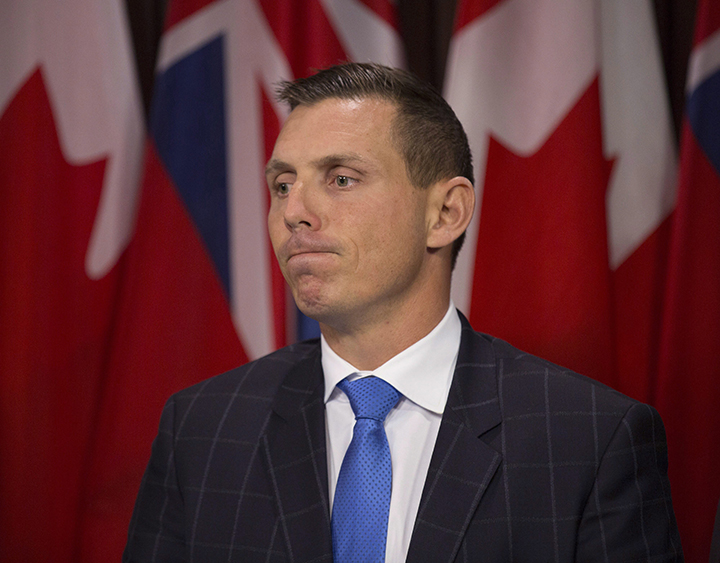The higher they rise, the farther they fall.

Last night, Ontario PC Party leader Patrick Brown exited the political stage, shaken, teary-eyed and literally pursued by the press corps as he fled the provincial legislature in the middle of the night.
Accused of sexual impropriety and assault by two women, one of whom was a high school student at the time, the other who was an intern in his office, Brown denied the accusations, and then later sent out a resignation letter. For the good of the party, four months from the next election, “I have decided to step down as Leader of the Ontario PC Party. I will remain on as a MPP while I definitively clear my name from these false allegations.”
It was a far cry from the confident Brown touted as the PC’s great hope less than three years ago, when he defeated favoured candidate Christine Elliott for the party leadership. “I’m excited,” he told the enthusiastic crowd that night. “We are going to move mountains, we are going to build a better and greater Ontario…We will win the next election.”
Brown’s dream of victory died Wednesday night; whether the PCs can achieve it under a new leader remains an open question. Naturally, a lot has been said about the complaints, the fallout for Brown, and the fallout for the party. But there are other issues that need to be addressed as well. Here are three that give me pause as a journalist, a woman, and a political observer.
WATCH BELOW: Queen’s Park panel weighs in on the Patrick Brown sex scandal

The first is about the way all this came out, and the way so many similar accusations are coming out, in the era of #MeToo. Namely, how – and when – should the media report on sexual accusations involving public officials? Particularly when they have been floating around the press corps for years? In Brown’s case, his conduct was even talked about by his constituents: Brown’s conduct with young women was, as a Barrie caller to the Stafford Show on Global News Radio put it, termed “Fifty Shades of Brown.”
Yet it was only now, four months to an election, that the media definitively reported the accusations. And despite the swirl of rumours, media outlets published stories like this profile of Brown by the Toronto Star, less than three years ago: “These days, nearing his 37th birthday, Brown is as sleek as a seal, as fit as a decathlete, as focused as a neurosurgeon. He has the gleaming good intentions and door-knocking enthusiasm of a Mormon missionary. He remains so squeaky-clean — never smoked, never drank — his friend Kevin Bubel habitually refers to him as “The Kid.””
Clearly Brown wasn’t so squeaky clean if these allegations were remotely true. So why weren’t they pursued before? Did the media need #MeToo to make these public? Was that “comfort level” necessary to break the story? Or was it timed for maximum impact, following the dictates of Toronto Star writer Val Sears, who famously quipped in 1962 as he boarded the John Diefenbaker campaign plane, “To work gentlemen. We have a government to overthrow!”
The second issue involves the public and sexual morality. Our standards for what is unacceptable sexual behaviour have changed, particularly when it comes to politics. Politics and sex scandals are old bedfellows – from British cabinet minister John Profumo sleeping with prostitute Christine Keeler in the 1960s, to would-be presidential candidate Gary Hart cavorting with Donna Rice in the 1980s, to former U.S. president Bill Clinton soiling Monica Lewinsky’s dress in the 1990s. But in the last century, scandals revolved less around sexual coercion, and more around infidelity and sexual taboos. Clinton’s blurred the two, but today, it seems cheating isn’t even an issue: consent is.
Brown was single; he didn’t step out on anybody. But he ran afoul of a different moral issue: abuse of power. It has now ensnared politicians from former U.S. president George Bush to Congressman Al Franken to, just last night, Brown and Nova Scotia PC leader Jamie Baillie. Using a position of power to touch someone or obtain sexual favours is no longer acceptable. In Brown’s case, important factors were also the age of the complainants, the alcohol he allegedly gave one when she was underage, the status he had as an elected official, and the relationship he had as the boss of the other complainant. These are at the crux of the matter, and it is because of this general abuse of power that he had to resign.
The final point is a warning about hypocrisy. Brown appealed to social conservatives to win his leadership, then turned his back on them when he did an about-face on the new sexual education curriculum in Ontario schools. He then presented himself as a progressive, and a champion of women’s rights, when it appears that his private life held a darker side.

Get daily National news
Falling from a self-created pedestal makes the landing much harder. That’s not to say that leaders should put all their flaws on the table, but it is to say that you can’t say one thing and do another.
In the age of social media and #MeToo, it will catch up with you. And it caught up with Patrick Brown on Wednesday night.
Tasha Kheiriddin can be heard between noon and 2 p.m. ET on Global News Radio 640 Toronto. She’s also a columnist with Global News and iPolitics.








Comments